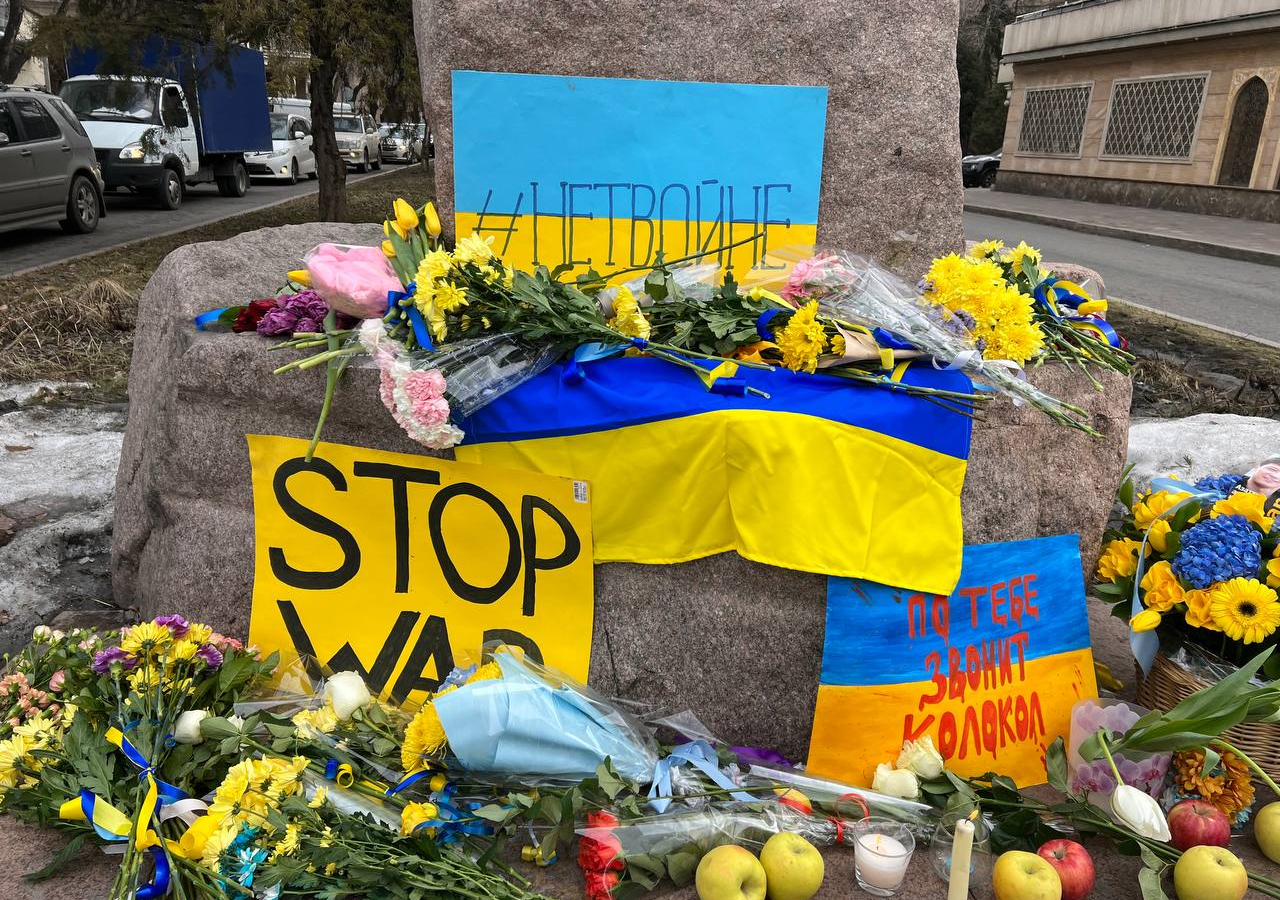Attacks against journalists continue in Kazakhstan. On February 22, journalist Daniyar Moldabekov was hit in the face by another man in a medical mask as he was leaving his apartment building. On the night of February 20, journalist Vadim Boreiko said two cars owned by his video operator were set on fire.
The ministry of internal affairs said on February 22 that since September the authorities had detained 18 people accused of attacking journalists. The following day, the ministry added that “it is still early” to define them as planned attacks. A draft law “On mass media” has received harsh criticism from journalists and freedom of the press advocates, as it would further curtail the rights and protections for media workers.
Dozens gathered by the monument to Taras Shevchenko in Almaty on February 24 to commemorate the one-year anniversary since the start of Russia’s war against Ukraine. Besides showing anti-war banners, people laid flowers, lit candles, and placed apples by the monument.
Prime minister Alikhan Smailov said on February 18 that foreign direct investment in the first nine months of 2022 had increased by 17.8% to $22 billion. While acknowledging the positive impact of a lighter tax code, Smailov failed to openly mention the role that the war had in the relocation of companies and capital from Russia to Kazakhstan, defining it as a “new economic reality”.
Between February 19-22, the Caspian Pipeline Consortium, the company managing a major oil pipeline from Kazakhstan’s western oil fields through Russia to the Black Sea port of Novorossiysk, stopped loading crude at its marine terminal due to bad weather. On February 22, it also stopped accepting shipments from the giant Tengiz oil field near Atyrau due to overstocking. On February 23, the company said it resumed loading oil onto tankers.
Energy minister Bolat Akchulakov said on February 22 that state-owned Qazaqgaz and Russia’s Gazprom are planning to build a Russia-Kazakhstan-China gas pipeline along the route Kostanay - Astana - Pavlodar - Semey - Oskemen. This route would also complete a long-planned gas network across the north-east of the country.
A spokesperson at Kaztransoil, the country’s pipeline monopolist, said on February 21 the company had not yet shipped any oil to Germany via the Soviet-era Druzhba pipeline. The ministry of energy had promised the first shipments already by the beginning of February.
Antony Blinken, the US State Secretary, will visit Kazakhstan on February 28 and meet with President Kassym-Jomart Tokayev and Mukhtar Tleuberdi, the minister of foreign affairs. Blinken’s visit is linked to a Central Asia-US high level meeting in Astana.
A range of independent candidates gathered on February 19 for the first election campaign rally in Almaty. Around 100 people attended the rally, in which candidates voiced their programs and urged for unity among non-party members for the March 19 parliamentary and local assembly elections. On the same day, the Central Election Commission said it denied registration to 125 potential candidates in single-mandate districts out of 609 applications received.
A helicopter operated by KazAviaSpas, the ministry of internal affairs’ emergency team, crashed in the north-west of the country near Uralsk on February 23 due to bad weather. Four out of six people on board were killed.
The ministry of labor published on February 22 a list of 21 professions “in high demand” that will allow foreign workers to be in a preferential line to receive a residence permit. The decree, which will cover professionals working in sectors such as healthcare, IT, and science, will come into effect on February 28.
The Pavlodar financial monitoring department said it unveiled an illegal scheme for the transit of grain from Russia to Uzbekistan, Afghanistan, and Tajikistan. In order to obtain a preferential tariff in 2021-2022, a Russian company allegedly used fake invoices from farms in Kazakhstan. This caused a damage of $334,000 to the state-owned railway company KTZ-Freight Transportation.
Поддержите журналистику, которой доверяют.








